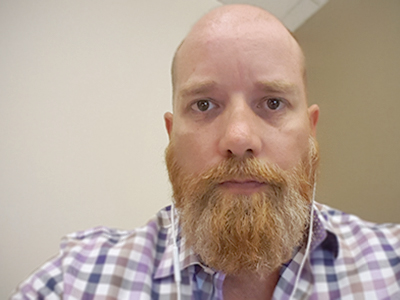
“I say yes to participating in research because it just makes sense to do anything to help improve the health care process.”
– Paul Shipton, West Vancouver
West Vancouver resident Paul Shipton knows pain. For 10 months, the 44-year-old portfolio manager endured the intermittent pain of a large kidney stone as he went through the process of getting referrals from his doctor to see a urologist and then a surgeon, and he underwent the necessary blood tests, CT scans, and ultrasound scans along the way. Through the referrals and scans, he learned that he had a kidney stone the size of a golf ball.
“It would cripple me for a few hours and I’d lie down, or the pain would get so bad that I’d throw up, and for some reason–maybe I dislodged the stone or something–I’d feel relief,” he explains. “At one point I went to the emergency department because the pain was unbearable. I got meds, but the doctors said that unless the stone was causing bleeding or a rupture, there was nothing they could do but to wait for it to pass or wait for my upcoming visit to the surgeon to determine how to proceed.”

“I burned through that first prescription of pain meds pretty quickly,” he adds.
Kidney stones are crystals made from minerals and salt that can form in urine. Usually, they can be passed while urinating, sometimes with the help of medication. In more serious cases, surgery is needed to remove them.
Shipton’s surgeon, Vancouver Coastal Health Research Institute clinician and scientist Dr. Ben Chew, performed the surgery at Vancouver General Hospital (VGH), which receives approximately 80 per cent of such large kidney stone cases in B.C. Other health care facilities don’t have the technology or specially trained staff to perform the percutaneous nephrolithotomy (PCNL) procedure, which is reserved for removing kidney stones larger than two centimetres in diameter.
A PCNL is a minimally invasive procedure in which patients are put under general anaesthesia and a small incision is made in the patient’s back in order to insert a tube tract that leads to the site of the stone. The stone is then broken up in place by a small medical-grade jackhammer and the surgeon then plucks the remaining debris and dust out of the kidney. Patients are then left with the tube in their back and stay one night in the hospital for recovery. Ninety per cent of patients recover within one week.
“Giving out so many antibiotics can lead to a person’s resistance to other bacteria decreasing and can also breed bacteria that are resistant to the drugs,” explains Dr. Chew.
Unfortunately, there exists a significant risk of urinary tract infection (UTI) post PCNL, potentially adding a great deal of discomfort during recovery. While it’s standard practice for patients to receive one dose of antibiotics right before surgery, some surgeons administer additional antibiotics in the weeks or days leading up to a PCNL, in an effort to reduce the risk of UTI. However, there are no guidelines for this process and no information about how effective it is for reducing UTI risk.
Dr. Chew is part of an international research collaboration hoping to reduce that risk through research that will inform and standardize guidelines about the amount of antibiotics that should be administered before a PCNL.
“In the United States, PCNL patients get antibiotics one or two weeks beforehand and then afterwards too, but this has more to do with their cautious and protective medical and legal culture–there’s no research evidence for it,” says Dr. Chew.

“The antibiotics themselves may cause problems like diarrhea or changing intestinal flora, that may not be helpful to patients,” he adds.
Dr. Chew, who is also conducting the research as part of the EDGE (Endourologic Disease Group for Excellence) Research Consortium, explains that because nobody has done these sorts of studies looking at today’s antibiotics and modern resistant bacteria, this research is necessary to develop a standard of care.
“We’re hoping to have a guideline to help urologists decide the amount of antibiotics they should be giving based on good evidence,” says Dr. Chew.
The study includes 80 patients. Half of them will receive antibiotics one week pre-operatively; the other half will not receive any save for the one dose that all patients get right before surgery.
Shipton, who made a full recovery from his PCNL within one week, chose to participate in the study because he normally does not take medications and thought he would make for a good subject. Participating in health research was an easy decision for him.
“Anything that helps improve the health care process, the creation of these processes and knowledge, or quality of life just makes sense.”
THIS IS ONE PATIENT’S STORY OF PARTICIPATING IN A CLINICAL TRIAL. YOUR EXPERIENCE MAY DIFFER. LEARN MORE ABOUT CLINICAL TRIALS BEFORE PARTICIPATING.


